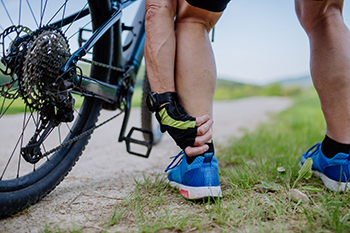1648 US Highway 130
North Brunswick, NJ 08902

Athletes employ various tactics to shield themselves from the discomfort of plantar fasciitis, a common ailment among active individuals. Proper footwear selection plays a pivotal role, with athletes opting for supportive shoes that offer ample cushioning and stability. Additionally, incorporating stretching and strengthening exercises into their routine helps maintain flexibility and strength in the muscles and ligaments of the feet and lower legs, reducing the risk of strain and injury. Gradual progression in training intensity and duration also proves beneficial, allowing the body to adapt gradually to increased demands and minimizing the likelihood of overuse injuries like plantar fasciitis. Podiatrists may prescribe orthotic inserts or arch supports that can provide additional support and alignment for the feet. If you have heel pain, it is suggested that you consult with this type of doctor who can treat plantar fasciitis, and provide effective preventive solutions.
Plantar fasciitis can be very painful and inconvenient. If you are experiencing heel pain or symptoms of plantar fasciitis, contact Dr. Robert Fink from Brunswick Foot & Ankle Group. Our doctor can provide the care you need to keep you pain-free and on your feet.
What Is Plantar Fasciitis?
Plantar fasciitis is the inflammation of the thick band of tissue that runs along the bottom of your foot, known as the plantar fascia, and causes mild to severe heel pain.
What Causes Plantar Fasciitis?
How Can It Be Treated?
While very treatable, plantar fasciitis is definitely not something that should be ignored. Especially in severe cases, speaking to your doctor right away is highly recommended to avoid complications and severe heel pain. Your podiatrist can work with you to provide the appropriate treatment options tailored to your condition.
If you have any questions please feel free to contact our office located in North Brunswick, NJ . We offer the newest diagnostic and treatment technologies for all your foot and ankle needs.

Embarking on multi-day bicycling adventures can be exhilarating, but it is essential to be mindful of potential foot and ankle injuries that may arise during prolonged rides. One common issue cyclists encounter is overuse injuries, such as Achilles tendonitis or plantar fasciitis, caused by repetitive pedaling motions. These conditions can lead to pain, stiffness, and inflammation in the foot and ankle, impacting performance and enjoyment. Additionally, improper bike fit or footwear can contribute to discomfort and strain on the feet and ankles, increasing the risk of injury. Furthermore, cyclists may experience acute injuries from falls or collisions, such as ankle sprains or fractures, which require immediate attention and care. To prevent foot and ankle injuries while cycling for multiple days, cyclists should ensure wearing supportive footwear, incorporate rest breaks and stretches into their rides, and listen to their bodies for signs of discomfort or fatigue. If you have endured a foot or ankle injury while bicycling, it is suggested that you consult a podiatrist who can provide you with an accurate diagnosis and treatment options, in addition to tips that can help to prevent future cycling injuries.
Sports related foot and ankle injuries require proper treatment before players can go back to their regular routines. For more information, contact Dr. Robert Fink of Brunswick Foot & Ankle Group. Our doctor can provide the care you need to keep you pain-free and on your feet.
Sports Related Foot and Ankle Injuries
Foot and ankle injuries are a common occurrence when it comes to athletes of any sport. While many athletes dismiss the initial aches and pains, the truth is that ignoring potential foot and ankle injuries can lead to serious problems. As athletes continue to place pressure and strain the area further, a mild injury can turn into something as serious as a rupture and may lead to a permanent disability. There are many factors that contribute to sports related foot and ankle injuries, which include failure to warm up properly, not providing support or wearing bad footwear. Common injuries and conditions athletes face, including:
Sports related injuries are commonly treated using the RICE method. This includes rest, applying ice to the injured area, compression and elevating the ankle. More serious sprains and injuries may require surgery, which could include arthroscopic and reconstructive surgery. Rehabilitation and therapy may also be required in order to get any recovering athlete to become fully functional again. Any unusual aches and pains an athlete sustains must be evaluated by a licensed, reputable medical professional.
If you have any questions please feel free to contact our office located in North Brunswick, NJ . We offer the newest diagnostic and treatment technologies for all your foot and ankle needs.